I have been letting Chuck do the talking this week covering Clean Cities and Ethanol Day. Now it’s time to catch up on some Domestic Fuel news:
Senator Tom Harkin (D-IA) announced a new biofuels policy in the Senate, while House Ag Democrats unveiled a comprenesive biodiesel energy package.
The U.S. Department of Agriculture’s latest price forecast for corn predicts that ethanol will contribute to higher prices this year. USDA officials expect corn prices to average $2.45 per bushel in the coming marketing year, up more than 22 percent from last year. Lots of stories out there about it, here’s a link to the Des Moines Register piece.
Missouri Corn Growers have their ethanol bill. Governor Matt Blunt is expected to sign a statewide ethanol standard that mandates gasoline sold in Missouri contain 10 percent ethanol. The bill passed overwhelmingly in both houses.


 To get a perspective on how well the Clean Cities Congress went this year I interviewed AFVI Executive Director, Annalloyd Thomason again before leaving.
To get a perspective on how well the Clean Cities Congress went this year I interviewed AFVI Executive Director, Annalloyd Thomason again before leaving. 


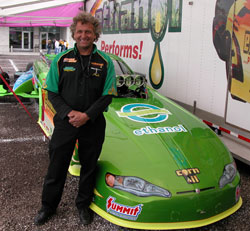 Being a farmer today has its challenges. Being a farmer and a funny car driver simply magnifies those challenges.
Being a farmer today has its challenges. Being a farmer and a funny car driver simply magnifies those challenges. 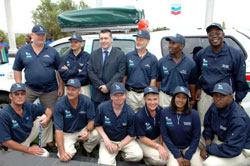 I hope you like our event blogging. I’ve been receiving some very nice comments on it, thank you. Here’s a story about an event that’s being blogged in Africa that you might be interested to check out. Keep your eyes on Domestic Fuel too as I have a couple of events coming up that will be covered extensively.
I hope you like our event blogging. I’ve been receiving some very nice comments on it, thank you. Here’s a story about an event that’s being blogged in Africa that you might be interested to check out. Keep your eyes on Domestic Fuel too as I have a couple of events coming up that will be covered extensively.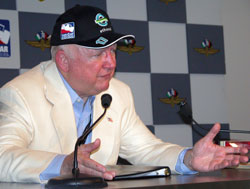 Secretary of Energy Samuel Bodman held a press conference here at Ethanol Day at the Indianapolis Motor Speedway.
Secretary of Energy Samuel Bodman held a press conference here at Ethanol Day at the Indianapolis Motor Speedway.
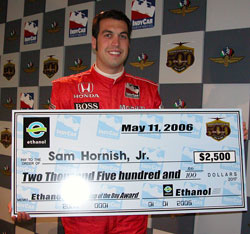 The
The 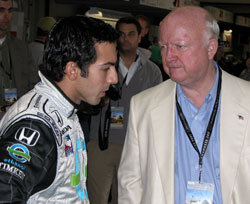 Secretary of Energy Bodman (r), got to learn more about ethanol and the Rahal-Letterman Ethanol Car with driver Jeff Simmons prior to getting his turn in a car on the track. He spent quite a few minutes with Jeff at the car, pointing to various components and asking lots of questions.
Secretary of Energy Bodman (r), got to learn more about ethanol and the Rahal-Letterman Ethanol Car with driver Jeff Simmons prior to getting his turn in a car on the track. He spent quite a few minutes with Jeff at the car, pointing to various components and asking lots of questions. Our Energy Secretary found out firsthand what it feels like to crank up the RPM’s in an Indy Car. He took a couple laps with driver Davey Hamilton in a 2-seater.
Our Energy Secretary found out firsthand what it feels like to crank up the RPM’s in an Indy Car. He took a couple laps with driver Davey Hamilton in a 2-seater. Well I’m here at the Indianapolis Motor Speedway on “Ethanol Day.” The day started out wet but dried up just before the
Well I’m here at the Indianapolis Motor Speedway on “Ethanol Day.” The day started out wet but dried up just before the 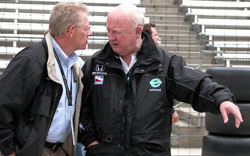 he’s seen here today and says that his visit here means a great deal to him personally. As for his department, he says they’re seeking more and more ethanol to be used all through our country. The Secretary is from Illinois and this is his first visit to the track. He also made the point that ethanol helps make sure that the money spent by consumers on gas, stays here in the country. The Secretary is pictured trackside (r) with Tom Branhan, CEO of
he’s seen here today and says that his visit here means a great deal to him personally. As for his department, he says they’re seeking more and more ethanol to be used all through our country. The Secretary is from Illinois and this is his first visit to the track. He also made the point that ethanol helps make sure that the money spent by consumers on gas, stays here in the country. The Secretary is pictured trackside (r) with Tom Branhan, CEO of